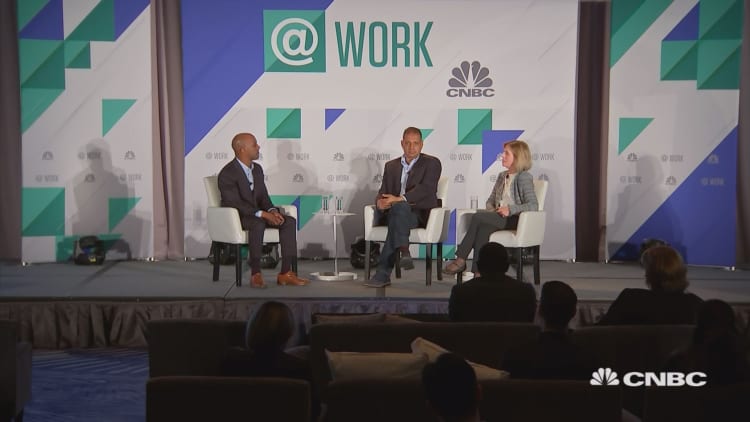Artificial intelligence has thoroughly penetrated home life through virtual assistants such as Apple's Siri, Amazon's Alexa, Google Assistant and Microsoft's Cortana. Now it is making inroads into the office market, with companies of all sizes and across industries, from finance to natural resource companies and tech firms, testing AI across their workforces.
Experts say virtual assistants have the potential to dramatically alter the lives of white-collar workers, providing employers with unimaginable levels of data that can be analyzed to improve decision-making. But to do so, these AI technologies — sitting on desks and in conference rooms — will be monitoring every word employees speak, along with their tone.
"The amount of data being collected about every individual, every moment of the day, will explode as AI-enabled virtual assistants become ubiquitous," said Dr. Louis Rosenberg, CEO and chief scientist at the technology company Unanimous AI. "These tools will not just be documenting what we say and what we type, but will be observing our reactions, predicting our next steps and tracking the accuracy of their forecasts, even documenting our moods."
Today most AI systems can listen and respond to verbal commands, but their ability to interpret nonverbal cues, such as pitch, tone, eye movement, hand gestures and how you stand is developing rapidly, said Josh Feast, CEO and co-founder of Cogito, a company that uses AI to help sales and service professionals. "The way we interact with (virtual assistants) will evolve to resemble actual human-to-human interactions," he said. "Everyone in an office will effectively have a personal-behavior assistant. "Technology will be much more pervasive in the office."
Cogito's AI is currently being used by health care, banking and insurance companies to help agents. The system displays visual cues to call-center agents to alert them if they are interrupting or speaking too quickly. It will also suggest ways to respond appropriately if the customer is getting emotional and needs empathy. Apple — which declined to comment — teamed up with Salesforce to offer Siri to corporate customers in September.
As the AI moves beyond chatbots for the customer service department and is inserted into all walks of office life, AI will be monitoring many employees in real-time and word by word. Even employees' health. Feast said the technology will monitor heart rate, breathing and blood pressure, along with verbal and nonverbal cues to determine the physical and emotional state of users and then coach them to improve behavior.
"Unless regulations prevent it, AI-enabled virtual assistants will become the eyes and ears of HR departments, disseminating data on the work habits and enthusiasm of employees," Rosenberg said. AI will be able to listen in on meetings and take notes, assess who's participating and document the tone — positive or negative — used by speakers. "I would hope regulations require companies to inform people when an AI is listening to a meeting and tracking participation."
Amazon — which did not respond to multiple requests for comment — has an Alexa for Business unit, which currently touts its use as a conference-call technology replacement, for use at an employee's desk and even at home. A recent blog post from the Alexa for Business team discussed new "usage metrics across all shared devices managed by Alexa for Business, as well as private skill usage across users and devices."
On its website, Alexa for Business lists clients across a range of industries — Conde Nast, GE, Fender and Brooks Brothers are among customers referenced.
Unclear if regulation is coming
Professional organizations are discussing standards that can be applied. One example of this is the Institute of Electrical and Electronics Engineers, a global technical professional organization. Its Global Initiative on Ethics of Autonomous and Intelligent Systems seeks to encourage AI developers to prioritize ethical considerations, including how employers collect, store, use and share employee data.
But "it's not clear that institutions with the power to regulate yet appreciate the possible magnitude of the problem," Rosenberg said.
While companies' current ability to monitor employees' keystrokes represents a privacy concern, Rosenberg sees greater threats coming. Keystrokes only capture words, whereas AI devices capture inflection and emotion, which means the software can determine the sentiment behind the words.
"Listening in on verbal conversations is a substantial privacy issue. It's even worse than keystrokes because it's ubiquitous, continuous, and it's not just from the one person typing but from everyone in earshot." He added, "Without regulation ... the AI will report on you to your company — not just what you said, but how you said it."
There's a big vault of thought that executives don't have access to right now.Stephen WakelingCEO and co-founder of Phobio
Stephen Wakeling, CEO and co-founder of Phobio, a software development company, agreed that AI will be capable of listening in on many in-office conversations, but he takes a brighter view of the outcome. The ability to collect and analyze data points from these conversations will be of great use to companies and employees. "There's a big vault of thought that executives don't have access to right now," he said. "Robots can collect it, remove identifiers and look for trends."
Wakeling said employers' fear of litigation should go a long way to prevent privacy abuse. He also sees regulation stepping up. "I would imagine that as rights-to-privacy regulation evolves, AI would eventually allow employers to mine communications by employees at work or on company-owned platforms but protect the anonymity of employees," he said. "Yes, Big Brother is watching, but Big Brother that anonymizes data is helpful, not scary," Wakeling said.
AI can be used to improve employee morale and productivity by better predicting which positions and shift times are most suitable for specific employees. "People aren't effective if they're in a job that doesn't suit them, or if they're lonely and isolated at work. Happy people perform better," Wakeling said.
AI can also be used to keep far-flung employees connected. As telecommuting and the gig economy grow, digital assistants could help employers keep tabs on workers. "It will be much easier to measure all team-member effectiveness," Wakeling said. The positive view of all employee hours and productivity being tracked by AI is that companies will be able to better train and support remote workers.
Wakeling said that even if modifying the hours of individual employees yields small increases in productivity, the cumulative difference could be substantial. "When Google began to measure the performance difference between good and bad managers, the difference was almost imperceptible, but it turned out to be an impactful difference between keeping good engineers and losing them," he said. "In a more competitive human workforce, lots of other industries will face the same challenges."
Alphabet, Google's parent company, declined to comment.
How AI can track your sentiment in the workplace
Employee effectiveness and happiness already can be gauged directly through surveying, but also indirectly by having AI conduct sentiment analysis.
Sentiment analysis is a process currently used by companies to scan social media and news sites for mention of a company and determine the extent to which it is positive or negative, said Noah Waisberg, co-founder and CEO of AI software firm Kira Systems, which is being used in the legal profession for document review that in the past would have consumed the lives of law firm associates. It would not be a huge technical leap to have these systems listen in on conversations, phone calls, email and text, he said. The data collected could then be analyzed to determine morale if a new corporate policy is popular with staff or, for instance, if a change to the 401(k) plan was well received.
Svetlana Sicular, a vice president and AI analyst at the research firm Gartner, said another way the machines will be able to analyze the data they collect is called topic modeling — text is mined for patterns and language to identify the subject matter being discussed. But she added that the technology still has a ways to go, since many systems still cannot understand those speaking languages other than English.
"The interactions with AI become another data stream that can be harvested and learned from," said Tom Hoglund, vice president in Avanade's Modern Workplace Center of Excellence, which has a joint venture with Microsoft and Accenture for the digital transformation of the workplace. "Virtual assistants will be independent of the channel used to interact with them. For example, virtual assistants should use the same logic and machine learning to interact with users via audio, text chat, email or by observing activity on your computer, combining that with attributes it knows about you and proactively offering up help even before you ask for it."

Hoglund said that outside of call centers, companies typically begin using AI for internal employee-support functions.
Avanade helped a large mining company roll out new Microsoft Office 365 technology to its 60,000 employees. Knowing that internal IT support calls would spike with so many end users experiencing a new system, the client had Avanade create an AI-powered bot to answer questions about the new technology and resolve problems without human intervention.
"The AI was able to handle over 20 percent of the incidents that arose and 80 percent of the service requests," he said. "We have created a similar bot for our internal use at Avanade, which covers much more than just IT support and have found that it is helping with employee engagement as they get their questions answered at any time of day and not just when the IT, HR or other departments are open."
Within a few years humans and AI will become one collaborative intelligence team, said Dr. Cheemin Bo-Linn, co-chair of Women Corporate Directors of Silicon Valley and CEO and president of Peritus Partners, an analytics-based marketing IT consultancy. "Our DNA programs us to want to put people on problems. We need to widen our focus and accept that machines are better at some things."
A Microsoft spokeswoman said digital assistants for consumers and enterprise use are still in the early stages of innovation and development, and the technology will continue to evolve and get better over time.
"We see great value and promise for digital assistants in the workplace, and that is what drives a lot of our product decisions and vision for Cortana," she said. The spokeswoman said imagine a scenario where a client is meeting with a sales team to discuss how to make sure they finish strong that quarter. Cortana can provide insights into deals that are at risk and then reach out to a nearby human expert with the expertise to help.
"At the start of the 20th century, silent black-and-white filmmaking was cutting-edge," Gartner's Sicular said. "Those involved in its earliest days could not have imagined that film would have sound and color in the 1930s. The future of AI will be different than what we can imagine now, but sound and color are coming."
Those sounds and colors hopefully will not make it to the office bathroom stall, but watch out for your desk and conference-room console.
—By Joe D'Allegro, special to CNBC.com





